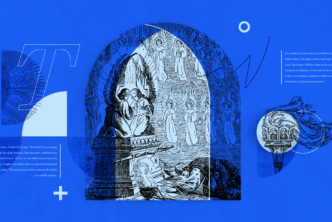Even elementary Bible readers quickly recognize that the Bible includes an Old Testament and a New Testament. For beginning readers, these two great divisions might seem to be equivalent to Part I and Part II.
As beginners grow in their understanding of Scripture, then, they soon learn that “testament” is another word for “covenant.” Thus, the Bible is divided into the Old Covenant Scriptures and the New Covenant Scriptures.
This intriguing fact raises more questions, for our aspiring Bible student will soon realize that there are multiple covenants mentioned within the “Old Testament”: the Noahic, Abrahamic, Mosaic, and Davidic covenants at least. The New Covenant, too, gets mentioned (prophesied) in the Old Testament—and some Bible students discern a creation (or Adamic) covenant in the opening chapters of Genesis.
Careful Bible readers will also soon recognize that New Testament believers do not do some of the things required of Old Testament believers. They do not circumcise their sons or offer sacrifices, for example. And modern Christians also do some things that were forbidden to Old Testament believers, such as eating pork.
Yet it is clear from reading the New Testament, with its abundant quotations of the Old Testament, that the Old Testament Scriptures remain relevant and authoritative to the New Testament believer.
How are we to make sense of the way the Old and New Testaments relate? Throughout church history, careful, orthodox students of Scripture have developed theological systems that seek to describe how the whole Bible—God’s whole plan for creation—works.
As one might imagine, such systems need to interpret and harmonize all the biblical data, and good Christians sometimes disagree on the best interpretations and the best synthesis of that data. For this reason, multiple theological systems have developed.
The book Covenantal and Dispensational Theologies: Four Views on the Continuity of Scripture allows four authors to expound the four most common systems.
- Michael Horton explains the way covenant theology puts the Bible together.
- Stephen Wellum takes a view called progressive covenantalism.
- Darrell Bock argues for a view called progressive dispensationalism.
- Mark Snoeberger argues for traditional dispensationalism.
This article will highlight a particular strength of each system as presented in the book.
Covenant theology
Michael Horton shows that there are two kinds of covenants in Scripture: “covenants of law” and “covenants of promise”—or grace covenants. This distinction is often misunderstood. All the covenants made with God after the Fall are graciously given; even the covenant made with Adam is part of God’s goodness to Adam. All post-fall covenants advance God’s plan to redeem mankind and all creation.
All covenants, including the law covenants, contain promises. All covenants, including the promise covenants, contain laws. These facts lead some to deny a distinction between law covenants and promise/grace covenants.
Horton gets to the nub of the distinction: the basis for the fulfillment of the covenants. In a law covenant the people with whom God makes the covenant need to keep the law in order to receive the blessings and avoid the covenant curses. In a promise or grace covenant, the blessings are unilaterally guaranteed by God.
This distinction between types of covenants is significant. The Mosaic covenant demonstrated that no one could be saved from sin by obedience to the law, because no human, apart from Christ, could ever fulfill the law. The Mosaic covenant itself pointed this out to Israel and directed the faith of the Israelites forward to the Messiah. What everybody needs is to be part of a covenant in which God unconditionally fulfills his promises on our behalf.
Progressive covenantalism
Stephen Wellum, while promoting the view for which he is known, “progressive covenantalism,” shows that there is a unified covenant plan that develops through a succession of different covenants.
The foundational covenant is the creation covenant. In this covenant the major themes that will run throughout all Scripture are introduced. After the Fall, the Noahic covenant confirms that God is going to fulfill his purposes for creation in a new creation. The following covenants are the means by which God brings this new creation kingdom to pass:
- The Abrahamic covenant reveals that the plan of redemption will advance through Israel in a way that will ultimately include the redeemed of the entire world.
- The Mosaic covenant was a covenant for Israel that Jesus fulfilled in its entirety.
- The Davidic covenant draws all the previous covenants together and indicates that they will be fulfilled by a Davidic king.
- Finally, the New covenant brings all the previous covenants to fulfillment. It differs from the Mosaic covenant because it is made with individuals, all of whom are born again.
This series of covenants forms the backbone of the Bible’s storyline.
Progressive dispensationalism
Darrell Bock, a well-known exponent of “progressive dispensationalism,” rightly recognizes that redemption involves not only the salvation of individuals but also the redemption of all sorts of creational structures that have been impacted by the fall of man into sin.
One of these creational structures is nations. Nations have always been part of God’s plan for salvation, and nations will continue to exist for eternity. God used one nation, Israel, to further his plan of redemption in the centuries leading up to the time of Christ, and God made covenant promises to this nation. Bock agrees that there is a land typology that will be fulfilled in the new creation. He also agrees that the land promises have been extended to include redeemed Gentiles who will, with redeemed Israelites, inherit the new creation.
But Bock argues that the extension of these promises to redeemed Gentiles does not cancel out the specific promises made to redeemed Israel. The nation of Israel will receive the land promised to it in the new creation and Gentile nations will also receive their own lands in the new creation.
The strength of Bock’s view is that it recognizes the variety of creational structures and institutions that will exist in the new creation. His view also avoids reducing these promises to abstractions but instead digs into the particularities of what it will look like for God to fulfill all his promises.
Traditional dispensationalism
Traditional dispensationalism raises several concerns to which the adherents of all views should remain sensitive.
First, Mark Snoeberger insists on the importance of adhering to the original meaning of scriptural texts. He is sensitive to the fact that there is a tendency among some views to not merely interpret the Old Testament in light of the New Testament but to reinterpret it in that light.
Second, Snoeberger is concerned that the mission of the church not be muddied. The church is a distinct institution in God’s economy with its own mission which should not be confused with the missions of other institutions. These are the strengths of his dispensationalist view.
Conclusion
Adopting these strengths from the various systems would result in a system that affirms that the New Testament should be used to understand and interpret the Old Testament but that Old Testament texts should not be reinterpreted to mean something other than what their authors originally intended.
This system would affirm a unified covenant plan of law and promise covenants that form the backbone of the Bible’s storyline. This storyline would include not only the creation, fall, and restoration of individuals but also the creation, fall, and restoration of other things God instituted in creation, such as nations. Within the creation order God has ordained numerous institutions, including the church, each of which has a distinct, God-ordained mission.
Of course, some readers will disagree with the strengths selected above. That’s okay. This article has attempted to demonstrate an approach to debates among careful, orthodox interpreters of Scripture. Instead of picking a team and defending it, look for the strengths (and weaknesses—another article for another time!) of each side’s arguments.
In some cases, this will result in adopting a particular side on a debated issue. But in other cases, this will result in benefiting from the insights of multiple sides and encouraging all sides to revise and refine their positions.
***
This article was originally published in the September/October 2022 issue of Bible Study Magazine. Slight adjustments, such as title and subheadings, may be the addition of an editor.
Related articles
- Review Essay of “Cracking the Foundation of The New Perspective on Paul: Covenantal Nomism Versus Reformed Theology” by Robert J. Cara
- How to Study Dispensationalism
Related resources
Covenantal and Dispensational Theologies: Four Views on the Continuity of Scripture (Spectrum Multiview Books)
Regular price: $23.99





